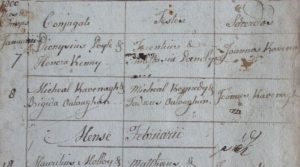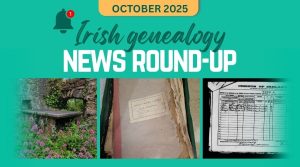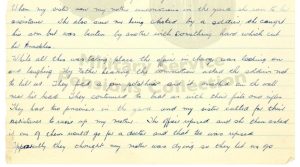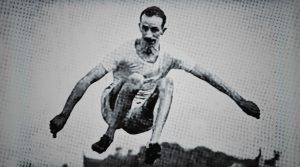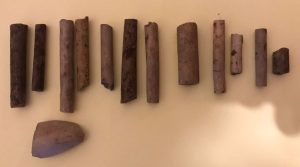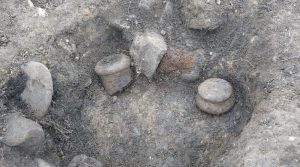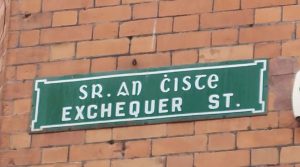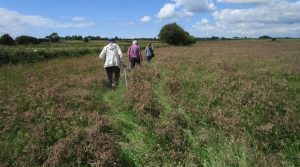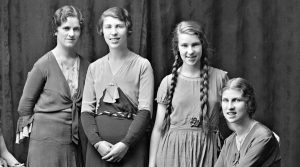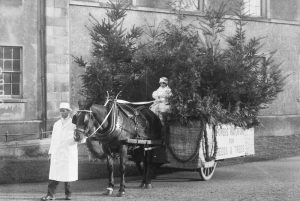The Hussey-Walsh manuscript collection has recently been digitized and a sample is now accessible online for free for a limited time only. It contains over 100,000 references to individuals, primarily from merchant, middle-class and upper-class Irish Catholic families, many of whom lived in the 18th century.
The Hussey-Walsh manuscript collection is one of the most important resources in the care of the Irish Genealogical Research Society (IGRS). This collection comprises 12 large handwritten volumes totalling 2,883 pages. It features over 100,000 references to individuals predominately from merchant, middle-class and upper-class Irish Catholic families. While the focus of these manuscripts is largely on families carrying the surnames Hussey and Walsh, they also include many thousands of references to associated families bearing other surnames.
A D V E R T I S E M E N T
The manuscripts were compiled mainly by family historian Valentine Hussey-Walsh (1862–1925) of Mulhussey (Mounthussey), Co. Roscommon, who came from a Catholic gentry family. Two volumes are attributed to Tenison Groves (c.1863–1938), a record agent born in Mullavilly, Co. Armagh, who worked at the Public Record Office of Ireland in Dublin from around 1900 until 1922.
The manuscripts contain transcripts from original Irish, English and French historical and genealogical material dating from the 12th to 19th centuries. Much of this material derives from archives and records, which were later destroyed in the fire that ravaged the Public Record Office in Dublin in June 1922. The collection, therefore, contains valuable information relating to the 18th century, a time when records concerning Irish Catholics are particularly scarce.
>>> RELATED: 102nd anniversary of Public Record Office fire marked with release of thousands of historical records
Each volume features notes and extracts from a wide range of sources, which can include copies of wills, marriage settlements, bills, answers and decrees from the courts of exchequer and chancery, notes from patent and close rolls, deeds, parish registers, marriage licence bonds, inquisitions post mortem, decrees of innocents, land claims, judgments from the courts of king’s bench and common pleas, notes from Dublin Castle state papers, extracts from Exchequer memoranda rolls and pedigrees, and other rare manuscripts.
>>> READ MORE: Understanding marriage settlements for Irish family history research
The Hussey-Walsh manuscripts were donated to the Irish Genealogical Research Society in 1937 and were recently digitized for online access, which enables researchers to search the content and view images of the original pages.
Sign up to our newsletter
One interesting record that we found while browsing the Hussey-Walsh manuscripts was a transcription of a chancery bill dated 3 February 1736, which details a legal dispute between Mark Lynch and Valentine Browne concerning the inheritance of lands in Co. Mayo and Talbotstown near Swords in Co. Dublin. It states that Valentine Browne was seized of these lands in 1712 and conveyed them for his lifetime, with provisions for his sons, then to his brother Peter Browne and subsequently to Peter’s sons. At the time of this settlement, Valentine was a Protestant, while his brother Peter and his son John Browne of Westport were identified as “Papists” (Catholics). John subsequently became the sole inheritor. However, Mark Lynch, who is described as a “Protestant discoverer”, is claiming rights to the estate in this bill. Under the 1709 Discovery Act, a Protestant discoverer could file a bill “discovering” a Catholic’s interest in a freehold or leasehold property held in contravention of the penal laws. As a reward, the discoverer gained the right to take over the lease for their own benefit.
This particular record is useful for genealogical research as it features names from two generations, family connections, locations, religious affiliations and inheritance practices, which provide essential data for constructing family trees but also for understanding the socio-political landscape of early 18th-century Ireland. While the loss of vast quantities of original records in 1922 is undoubtedly an impediment to genealogical research in Ireland, the Hussey-Walsh collection demonstrates the existence of a wealth of secondary sources that can help bridge the gaps.
A D V E R T I S E M E N T
Until the end of 2024, the entire first volume of the Hussey-Walsh collection, including its scanned images, is available to explore completely free of charge. This offer is available to non-society members. To conduct a free search of Volume 1, which generates both search results and images, click here. Non-members can also search Volumes 1 to 12 here, but this will only return the total number of matches (no images).
The Irish Genealogical Research Society was founded in 1936. Renowned professional genealogist John Grenham has referred to the society as the “great granddaddy of all Irish family history societies”. Membership is available to anyone interested in exploring their Irish heritage through the resources and support provided by the society. For information about membership perks, click here.
Visit the Irish Genealogical Research Society website to learn more about the Hussey-Walsh manuscript collection.
Sign up to our newsletter
Subscribe to the Irish Heritage News newsletter and follow us on Facebook, X, Instagram and Threads for all the latest heritage stories.
READ NOW
➤ Ulster Historical Foundation rolls out new expert-led online Irish genealogy course
➤ RootsIreland grows its Kerry resources with over 13,000 baptismal records from Castlegregory
➤ Irish civil records: what’s online and what’s not online?
➤ Tracing John F. Kennedy’s Irish ancestry through Wexford, Limerick, Cork and Fermanagh
➤ A genealogist’s guide to DNA testing for Irish family history research
A D V E R T I S E M E N T


